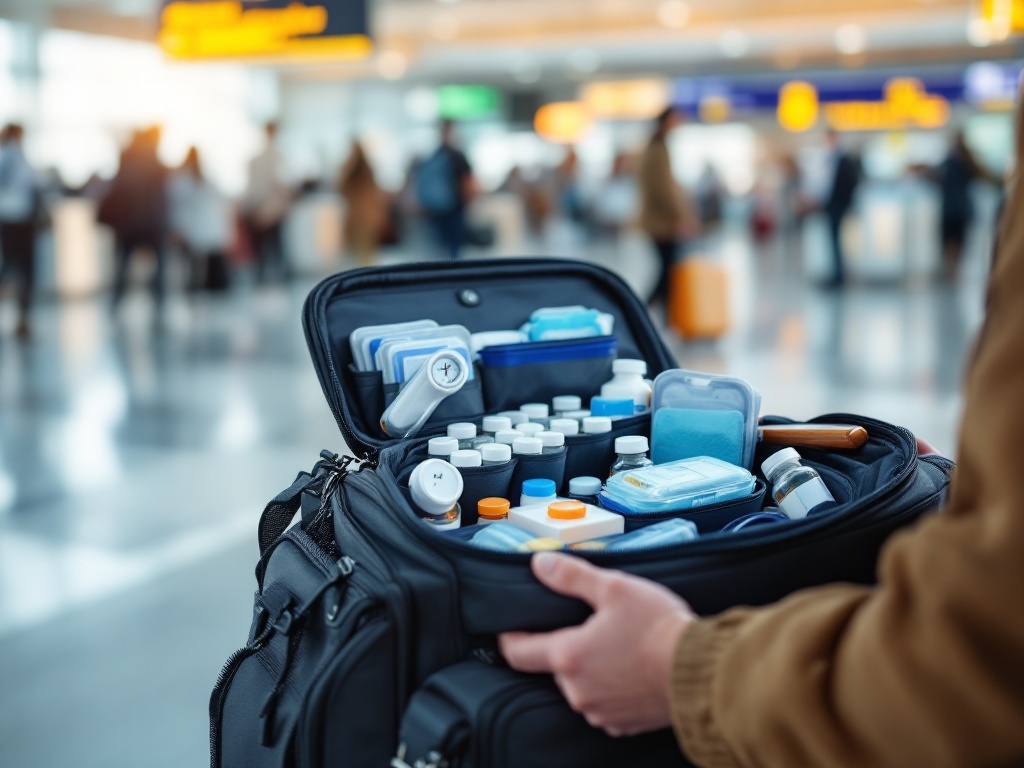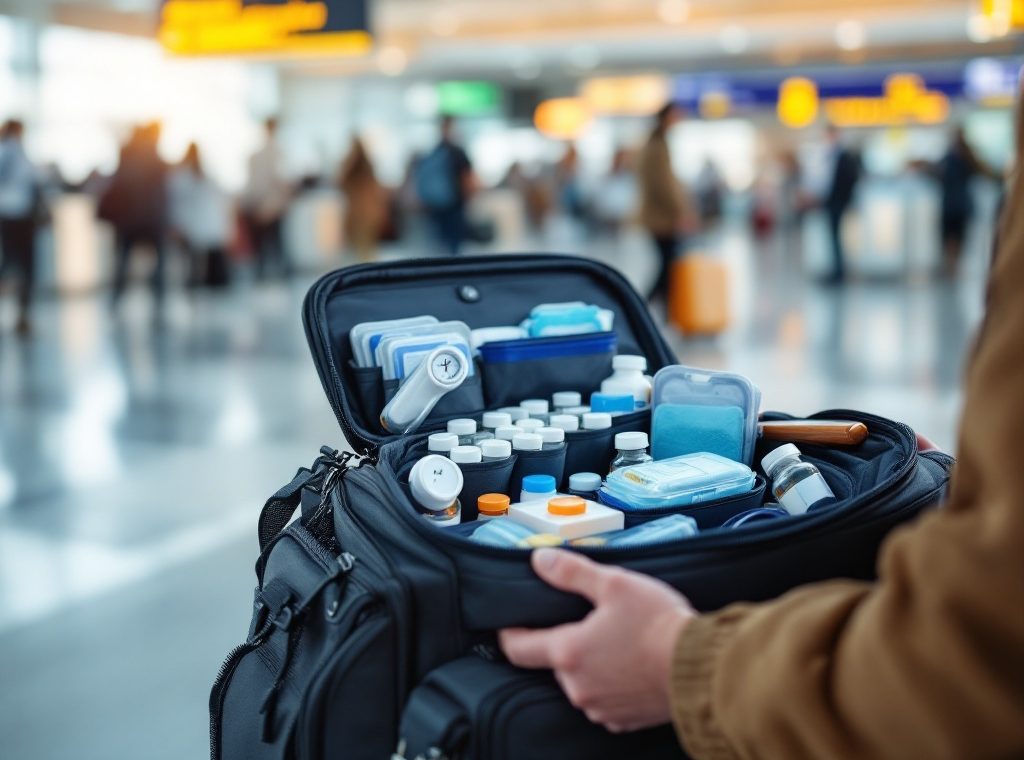How to Travel on a Plane with Medicine that Needs Refrigeration
Traveling with temperature-sensitive medications like insulin or biologics? Maintaining their effectiveness requires careful planning. Learn how to properly pack and transport refrigerated medications, navigate airline regulations, and ensure temperature control throughout your journey. Discover essential tips for a smooth and worry-free travel experience. Read on to safeguard your health and ensure your medications remain effective while you’re away.
Important information

- Always carry refrigerated medications in your carry-on luggage, not checked baggage, to avoid extreme temperatures.
- Get a doctor’s note confirming your need for refrigerated medication and keep it with your prescriptions.
- Pack medications in their original containers inside a cooler bag with ice packs or cooling gels.
- Inform the airline and TSA about your refrigerated medications to ensure a smooth security process.
- Request a hotel room with a refrigerator or utilize hotel ice machines to store medications upon arrival.
Understanding Refrigerated Medications for Air Travel
Some medications need refrigeration to stay potent and effective. Without a consistently cool temperature, these drugs can degrade, becoming less effective at treating your condition. Temperature control is especially vital for travelers who experience different climates.
Why Some Medications Need Cold Storage
Some medications, like biologics and insulin, are temperature sensitive and must be kept cool. Heat exposure can degrade these drugs, reducing their effectiveness. Proper cold storage maintains stability and ensures your medication remains potent, especially while traveling. Protect your medicine from temperature fluctuations by keeping it cool.
The Importance of Temperature Control
To ensure medication remains effective, it’s crucial to protect it from extreme temperatures. When flying, keep refrigerated medications with you in your carry-on luggage rather than in checked baggage, where it could be exposed to extreme heat or cold.
Preparing to Travel with Refrigerated Medications
Traveling with refrigerated medications requires careful planning. First, consult your doctor to discuss your trip and medication needs. Obtain a medical note specifying the medication name, dosage, and the necessity for refrigeration. This note will be helpful during security checks. Second, research your airline’s regulations on carrying medical supplies, especially restrictions concerning ice packs or cooling gels in carry-on luggage. Third, purchase a high-quality cooler bag designed for temperature-sensitive items. This will ensure your medication remains at the correct temperature. Fourth, pack extra ice packs to prepare for unforeseen travel delays. Fifth, store your medication in its original, clearly labeled packaging, and compile a list including generic names, dosages, and important medical history for emergencies. Finally, if traveling internationally, check the regulations of both your departure and destination countries regarding medications. Some nations have strict rules and may require specific documentation.
Consult your doctor to discuss your trip and medication needs. Obtain a medical note specifying the medication name, dosage, and the need for refrigeration.
Research your airline’s rules about medical supplies, especially restrictions on ice packs or cooling gels in carry-on luggage.
Buy a reliable cooler bag designed for temperature-sensitive items to maintain the correct temperature for your medication.
Pack additional ice packs to account for potential travel delays.
Keep your medication in the original, clearly labeled packaging. Create a list with generic names, dosages, and relevant medical history for emergencies.
For international trips, research the regulations of both your departure and arrival countries concerning medications.
Consult Your Health Care Provider
Before your trip, discuss your travel plans and medications with your doctor. They can provide personalized advice on maintaining medication effectiveness while traveling, considering your specific needs and health. Your doctor can also provide necessary documentation for your medications.
Gather Necessary Documentation for Medications
Obtain a doctor’s note specifying why you require refrigerated medication. Maintain a list of your medications, including dosages and relevant medical history. This information is crucial for navigating security checkpoints and invaluable in emergencies.
Packing Refrigerated Medications for Air Travel
Transporting refrigerated medications safely during air travel requires careful planning. Consider these options: a medical-grade cooler offers superior temperature regulation and insulation compared to standard coolers, or a travel cooler bag provides portability and ease of transport.To maintain the required temperature, use ice or cooling gel packs. This ensures medication safety throughout your flight.Always store medications in their original packaging. This allows for easy identification during security checks and preserves medication integrity and effectiveness.
Investing in a Medical-Grade Cooler
Medical-grade coolers are essential for safe medication transport, maintaining the required temperature during travel. Their superior insulation, compared to standard coolers, ensures more stable temperatures, which is critical for preserving drug efficacy. For enhanced security, choose a cooler with temperature monitoring to track internal conditions and guarantee medication safety and effectiveness.
Utilizing a Travel Cooler Bag
Traveling with medications requires careful planning, especially concerning temperature control. A travel cooler bag offers a practical solution for maintaining the required temperature of your medications, ensuring their efficacy. For convenient access, keep the cooler bag in your carry-on luggage. However, it’s essential to review the specific regulations of your airline regarding cooler bag sizes and types, as restrictions may apply. Additionally, carrying certain medications might necessitate a doctor’s note. Consult your airline and physician to ensure a smooth and compliant travel experience.
Incorporating Ice Packs and Cooling Gel Packs
Ice packs are crucial for keeping your cooler at the ideal temperature, and they should be completely frozen. Cooling gel packs offer a convenient alternative for maintaining a similar chill.
Keeping Medications in Original Packaging
To avoid travel disruptions, always carry your medications in their original packaging. This clearly identifies them and provides essential details like dosage and expiration dates, which is crucial due to varying air travel regulations. Original containers also expedite airport security checks, preventing delays and questioning.
Making Special Arrangements with Airlines
Before your flight, contact the airline to inform them about your refrigerated medication and inquire about their specific regulations. They may offer special accommodations or require certain documentation. Submitting a special assistance request, if possible, helps the airline prepare and confirms your needs. Also, confirm their cold storage procedures for your medication. Discuss available options, such as using a carry-on cooler or utilizing onboard refrigeration, if available.
How to Notify the Airline
Contact the airline beforehand to discuss options for keeping your medication refrigerated and make the necessary arrangements. This will ensure proper storage during your travel.
Submitting a Special Assistance Request
Contact the airline’s disability assistance team or customer service to explain your need for refrigerated medications. Inquire about specific forms or procedures for handling such requests and ask for assistance.
Ensuring Temperature Stability Throughout Travel
Pack sensitive medications in your carry-on luggage using a high-quality insulated cooler or medical travel bag.
Include ice packs or medically approved gel packs for extra cooling.
Use a thermometer to monitor the temperature.
Inform the airline and flight attendants in advance for potential assistance during the flight.
Navigating Airline and Security Regulations
Check airline regulations regarding medications, especially refrigerated ones. Most airlines accommodate them, but confirming their specific rules is recommended.
Inform the airline staff about your medical needs during check-in and again at the security checkpoint. This will ensure smooth processing and address any potential concerns.
Notify TSA officers about refrigerated medications before security screening. While they are generally allowed even if they exceed standard liquid limits, it’s advisable to keep them in your carry-on bag.
Carry essential medical liquids like insulin and injectable medications with proper documentation, such as a prescription or a doctor’s note. TSA agents will screen these separately.
Bring necessary cooling packs (gel, liquid-filled, or frozen) to maintain your medication’s temperature during the journey. These are generally permitted through security.
Understanding Airline Regulations for Medications
Traveling with refrigerated medications requires some preparation. Before your flight, contact your airline to understand their specific policies regarding medical supplies. You might need to provide advance notice or complete required documentation. While some airlines may limit the quantity of liquid medications allowed, always inform both check-in staff and security personnel about your medical needs to ensure a smooth trip.
What to Expect at the Security Checkpoint
Traveling with Refrigerated Medications:
Inform TSA officers about any refrigerated medications. These can travel in your carry-on, even if they exceed 3.4 ounces (100 milliliters).
For faster screening, separate your refrigerated medications from other belongings.
Medically necessary liquids, gels, and aerosols, including those in larger quantities, are typically allowed but might need extra screening.
Having a doctor’s note can make this process smoother.
Options for Medically Necessary Liquids and Injectable Medication
Essential medical liquids and injectables, like insulin, are typically allowed in carry-on bags, even if they exceed the usual liquid limits. For easier security checks, pack these items separately in a clear bag. You may need to get airline approval beforehand.
On-Flight Tips for Maintaining Medication Temperature
Pack temperature-sensitive medications in your carry-on bag, using an insulated container with ice packs. If you need a refill, ask a flight attendant for more ice or if the plane has a refrigerator.
Carry-On Bag Essentials
Keep essential medications in your carry-on, along with your doctor’s note and prescription. For temperature-sensitive medications, use ice packs, a cooler bag, or an insulated container. A temperature monitor can also provide added reassurance by tracking any temperature fluctuations during your travels.
How to Use an Insulated Transport Container
Chill an insulated container.
Place the medication, still packaged, inside.
Add ice packs or cooling gels to maintain the correct temperature.
Secure the container.
Requesting Ice from Flight Attendants
Traveling with refrigerated medication? Ask your flight attendant for ice. They can usually provide some in a sick bag or other container to help keep your medication cool.
Exploring Airplane Refrigerator Options
Traveling with temperature-sensitive medication? Many airlines provide refrigerated storage, so check with your airline in advance to ensure your medication stays cool and effective.
Managing Medication Upon Arrival
Upon arrival, request a room with a refrigerator. If none are available, you can utilize the hotel’s ice machines. For medication storage, inquire at the front desk.
Requesting a Room with a Refrigerator
When reserving your hotel room, request a refrigerator to keep temperature-sensitive medications properly chilled. Confirming its availability beforehand will guarantee your storage needs are met upon arrival.
Utilizing Hotel Ice Machines
Hotel guests can typically find ice machines, which are essential for keeping temperature-sensitive medications cool.
Front Desk Assistance for Medication Storage
Traveling with medication, most hotels offer refrigeration services. Simply inform them upon arrival.
Additional Considerations for Traveling with Refrigerated Medications
To ensure a smooth passage through airport security, have your doctor clearly specify your need for refrigerated medication. Pack your medicine in a reliable cooler bag with ice packs to maintain the correct temperature throughout your journey, including any transfers.
Doctor’s Letter and Additional Documentation
Obtain a doctor’s letter explicitly stating your need for refrigerated medication.
Gather supporting documentation such as prescriptions for the medication.
Present the doctor’s letter and supporting documentation to airline staff and security personnel.
Ensuring Temperature-Controlled Solutions in Transit
To keep refrigerated medicine cool while traveling, use a reliable cooler bag with ample ice packs or cooling gels for consistent temperature control. A medical-grade cooler is ideal for extended journeys. Significant temperature fluctuations can compromise medication efficacy. If this occurs, consult a doctor or pharmacist. They can advise you on the medication’s safety and if possible, re-cool the medicine with ice packs.

















